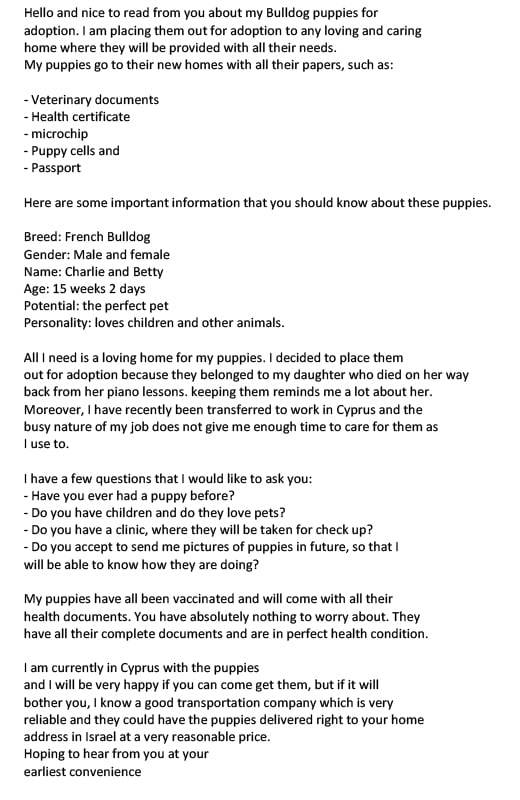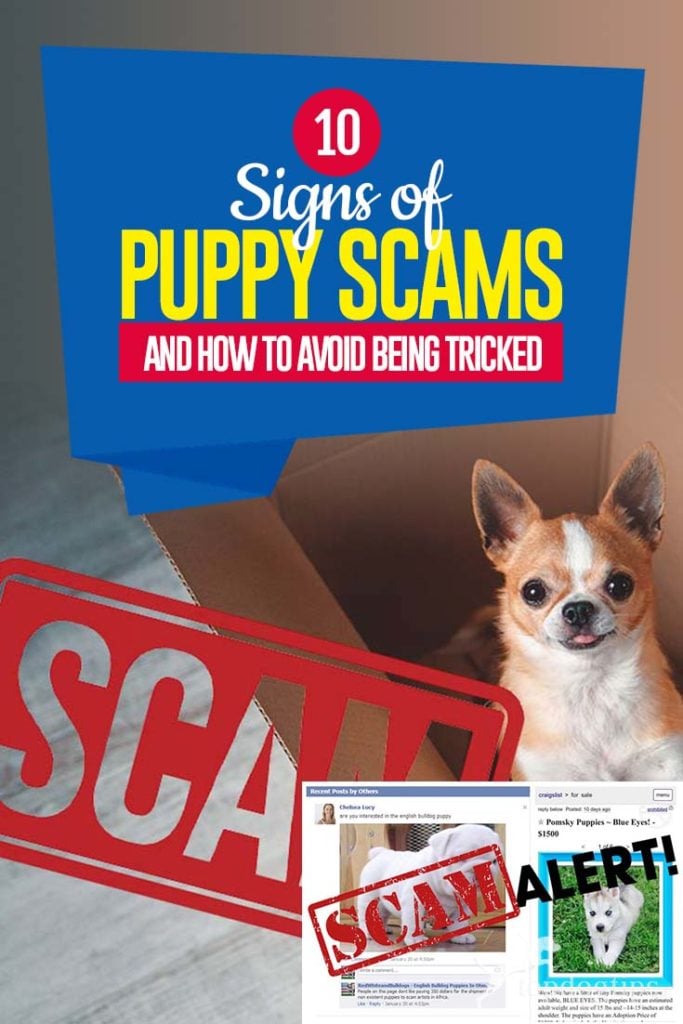Table of Contents
- The study also includes real stories of scammed people:
- What a Facebook puppy scam post may look like:
- 10 Signs of Puppy Scams
- 1. The Price is Fantastic!
- 2. Discounted or Negotiable Prices
- 3. The Dog is Free (But You Pay for Shipping)
- 4. No Refunds, Return,s or Warranties Against Health Issues
- 5. You Cannot Contact the Seller by Phone
- 6. Price Increases After Deposit
- 7. Refund Upon Receipt
- 8. Sad, Sad, Sad Story
- 9. Photos That Appear Elsewhere
- 10. Same Seller with Different Breeds for Sale
- 10 Ways to Avoid Craigslist Puppy Scams
- Common Questions about Puppy Scams
- Puppy Scams: Before You Go
Everybody agrees that adopting a rescue dog from a shelter is always more praiseworthy.
But if you're set on buying a puppy of a specific breed or age, note that online puppy scams have increased over the last few years.
Better Business Bureau (BBB) conducted a study on Craigslist puppy scams (and other similar internet sales of dogs), finding that 12.5% of all reported online purchase fraud was related specifically to puppy sale scams as consumers filed tens of thousands of reports.

The study also includes real stories of scammed people:
- One person sent money to a breeder of Huskies but never got the puppies.
- A very similar thing happened with an English Bulldog breeder, but the buyers could identify the fraud just before sending the money.
- A woman found an online ad to adopt a puppy from a family for free, and she'd only have to pay for shipping, which she did. Still, the costs kept increasing (extra payment for faster shipping, dog's health insurance, etc.), and she kept paying until Delta Airlines informed her she'd been scammed. Delta sued the scammers later.
Most puppy sale frauds are done over the Internet because online animal sales are still unregulated.
The US Department of Agriculture (USDA) regulates this area through its Retail Pet Store Rule, but it is yet to be enacted.
There are three main ways online puppy scams are done:
- Fake breeder's website, which you find from an online search;
- Ads websites like Craigslist or eBay;
- Facebook puppy scams where fraudsters disguised as real people post a sale of a dog for whom “they wish to find a new home.”
What a Facebook puppy scam post may look like:
Here's an example of an email a scammer may send:
Fraudsters primarily take advantage of people who want a purebred dog but do not want to pay the full price for the puppy at reputable breeders.
This will often range from $2000 up to $10,000 or even more. They offer the same breed of dog for ten times less.
After the victim's first payment, the scammer often makes up a believable story on why they need additional payment.
The farce will continue for as long as possible. This site explains more about the whole process.
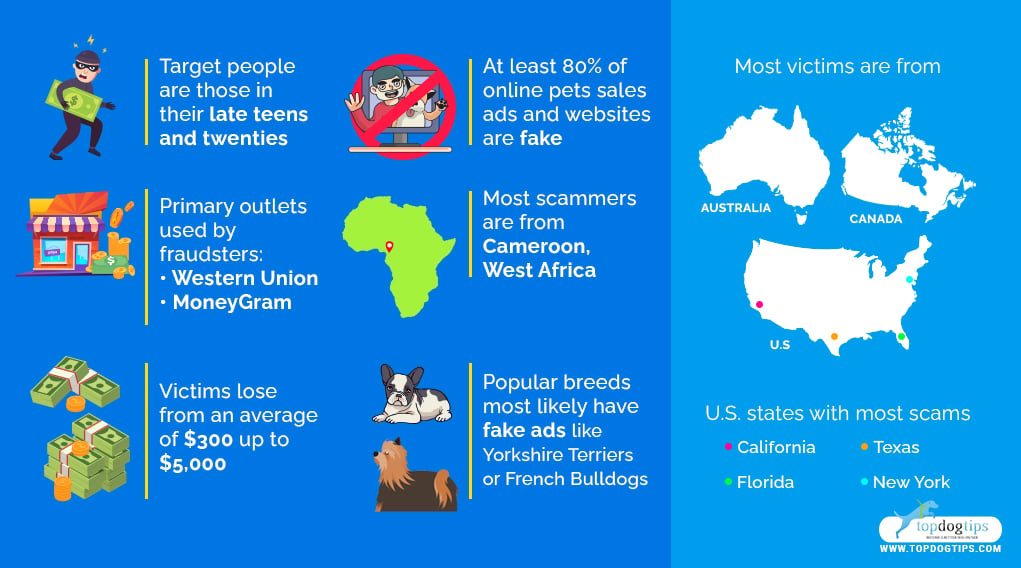
Important Facts from the Puppy Scam Study:
- Scammers often target people in their late teens and twenties;
- At least 80% of online pets sales ads and websites are fake;
- Western Union and MoneyGram are the primary outlets used by fraudsters;
- Most victims are from the U.S., Canada, and Australia;
- U.S. states with the most scams are California, Texas, Florida, and New York;
- Most scammers are from Cameroon, West Africa;
- The average amount victims lose is $300, but in some cases, it was up to $5,000;
- Most popular breeds are the ones most likely to be found on these fake ads (e.g., Yorkshire Terriers or French Bulldogs) because many people want to own them, and they're more difficult/expensive to get;
Federal Trade Commission (FTC) also estimates that only 10% of victims will file a report.
Thus, even though the number of complaints was nearly 40,000 in 2017, there are likely many more puppy scams taking place every day.
Here's how to spot them.
10 Signs of Puppy Scams
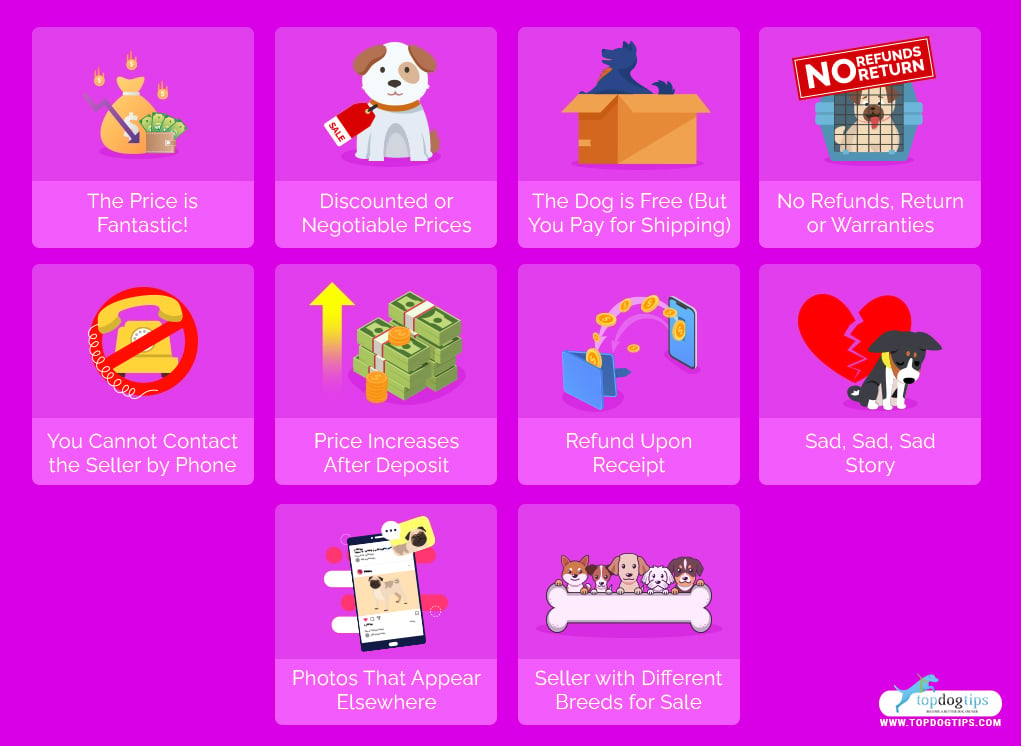
1. The Price is Fantastic!
You can't believe your eyes when you see the pictures and the low price.
Generally, the purebred dog of this breed will cost you about $5,000 at a reputable breeder, but the ad or the fake breeder's website offers the same dog for only $500.
If this is a local ad, the sellers will also have a reason to avoid a face-to-face meeting.
2. Discounted or Negotiable Prices
While some reputable breeders do, in fact, sell dogs they feel are not “show-worthy” at a discount, those dogs will be typically neutered.
In the ad or website, if you see claims of the dog still being breed-worthy for future pups, there's a good chance you've just found a dog-selling scam.
3. The Dog is Free (But You Pay for Shipping)
This is a common technique found on sites like Craigslist.
The seller says they wish to rehome the dog, and you only need to pay for the shipping.
They will require you to wire them money through Western Union or MoneyGram (or use a prepaid debit card), securing the dog for you.
You cannot trace such money wires.
They will also keep emailing you back about additional costs, such as quicker/safer shipping, etc.
4. No Refunds, Return,s or Warranties Against Health Issues
Reliable breeders take responsibility for and have confidence in their dogs.
If there is something wrong with your pup, they will always help with what you need or accept the dog back for a full refund.
Fake ones will not do that.
A reputable breeder can also tell you the dog's entire pedigree with ease, including health history and anything else you wish to know.
A fake breeder will not have such information; however, they can falsify this information.
5. You Cannot Contact the Seller by Phone
The only communication with scammers will be through email or text messages, both of which can go through proxy servers to hide true identifications.
However, even if someone does agree to speak over the phone, that does not indicate that it's not a scam. The only way to avoid this is through a face-to-face meeting.
6. Price Increases After Deposit
With a reputable breeder, the price you are quoted will be guaranteed, and any “extras” will be itemized before the deposit and clearly spelled out in writing.
With scammers, they will often add these “extras” one by one, as astronomical crate fees upward of $800, travel insurance for $1,000, increased shipping costs, and airport-to-door delivery.
Note that airports require picking up live animals on-site, with appropriate documentation.
7. Refund Upon Receipt
Sometimes the “seller” will promise a partial refund of insurance or shipping costs upon the dog's safe delivery.
This is a baited hook, making you feel more secure, so you pay the extra fees. They may also pressure you by saying that failing to pay higher fees can cause you to lose the selected puppy.
Or even worse – they will claim to report you to the FBI for animal abuse because your failing to pay puts the dog in danger.
8. Sad, Sad, Sad Story
This is most common with Facebook ads.
The story of why a person is selling or re-homing their pup or adult dog becomes more complex and heart-wrenching as it evolves.
There is a death in the family, loss of a job, or moving to a place that doesn't take pets.
Sometimes this is true, but unless you have a way of verifying it, remain wary.
9. Photos That Appear Elsewhere
One of the quickest ways to identify puppy scams is by using the seller's posted photos to see if they were published elsewhere.
Fraudsters generally use pictures of real puppies from other ads or Facebook posts, and you can use Google's reverse image search to check if that photo has been posted anywhere else.
10. Same Seller with Different Breeds for Sale
This can happen anytime, but you'll often see it during the holidays when people are more emotional about finding a new family pet.
Reputable breeders typically do not sell different breeds and only focus on one, but a scammer may sell different breeds.
This will be either in the same ad/website or done separately.
But you can search their email address to see if they posted any other ads with separate breeds.
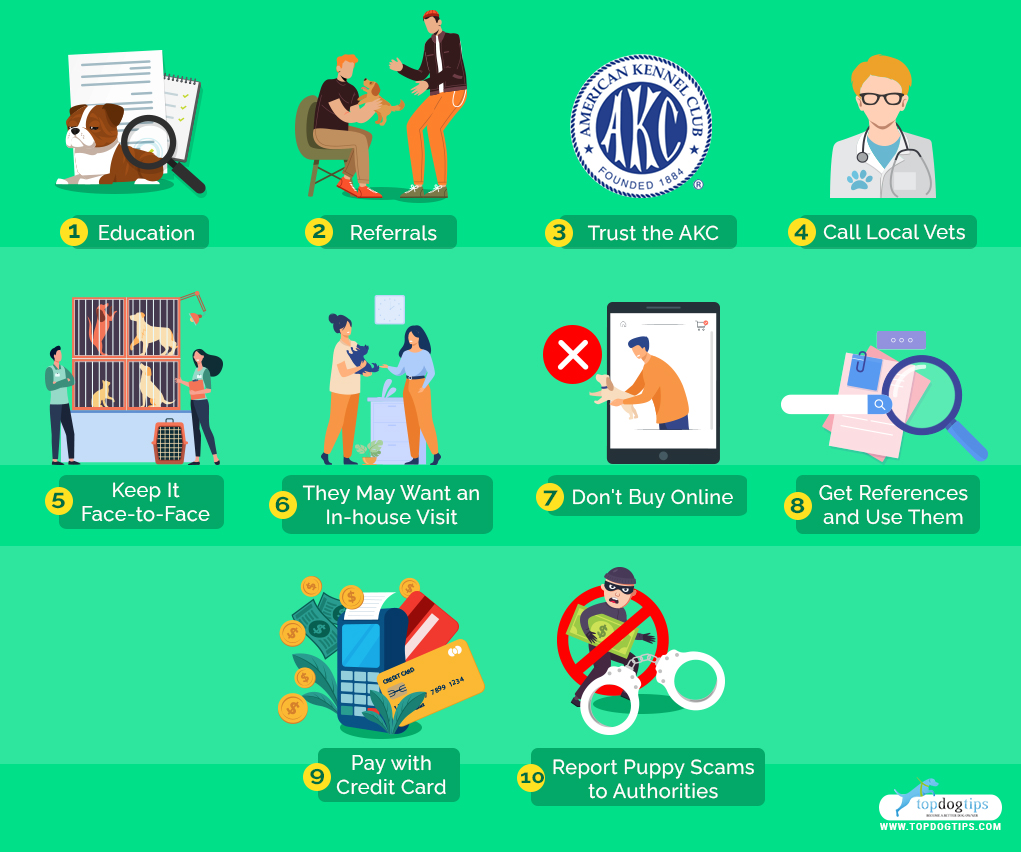
10 Ways to Avoid Craigslist Puppy Scams
So how do you protect yourself from being scammed when buying a puppy or adult dog online?
The two best ways are to either adopt a dog from a rescue shelter or buy from a reputable breeder (here's a list of American ones).
If neither of these is an option, here are some tips on avoiding Facebook or Craigslist puppy scams.
1. Education
Know about your chosen breed and any regulations that apply.
Real and professional dog sellers will always ask you questions because they care for their animals.
For example, take Pit Bulls.
Some towns do not allow this breed, and the breeder should know this, and they will need to research you before selling to you.
Always dig up as much information about the breeder/seller online, and look at the Better Business Bureau or other reviews.
2. Referrals
Talk to other dog owners.
You can also stop at a nearby dog-oriented event or visit a shelter.
You can gather buckets of information from people passionate about pups and willing to give you referrals.
Events can introduce you to reputable breeders or rescue organizations in your area to work with a person.
3. Trust the AKC
The AKC collects information and enacts inspections of breeders throughout the country.
For anybody wanting to buy pure breeds, this is a great starting place for finding a safe seller.
4. Call Local Vets
If you don't have one already, you are going to need a veterinarian anyway.
You can talk to vets while also asking for their input on regional dog sellers that they recommend.
Because they will often work on dogs sold from such places, they are a great resource of information.
5. Keep It Face-to-Face
Wait to buy a dog until after you've seen them up close and met the breeder or group organizer.
Make that first visit to the area where the dogs live. See how clean it is, how professional does it seem.
6. They May Want an In-house Visit
Some breeders do this but not all of them.
After they sell the dog to you, they may want to see how the pup adapts to your space, other pets, and household residents.
This is a great time for you to make sure that the pup fits into your lifestyle, and it's also a sign of a reputable seller.
7. Don't Buy Online
Avoid internet purchases unless you can travel to meet the dog.
According to the above study, dozens of sites have pets-for-sale listings, and 80% of them are scams.
Reputable breeders typically have waiting lists and far more professional means for advertising. Again, you want that meet-and-greet and nothing less.
8. Get References and Use Them
Sometimes people think that just because they provided references, everything is on the up and up.
Use those references and call them up.
Ask specific questions about their dog-buying experience. If all you get are fluffy, non-specific answers, that is a red flag.
9. Pay with a Credit Card
Avoid any money wires at all costs.
You want to have a traceable payment method so that you can dispute the purchase if need be.
Credit cards are best for this, and you can easily issue a chargeback if you get scammed.
10. Report Puppy Scams to Authorities
If you believe that you have encountered a puppy or adult dog buying scam, please report it. Here are some of the places you can quickly do this and help stop puppy scams:
- BBB’s Scam Tracker
- Petscams.com
- Federal Trade Commission (or call 1-877-FTC-HELP)
- State Attorney General
You can also share this information with veterinarians, local animal groups, Facebook, or other social media.
Word of mouth is a powerful tool. You can help another person or family avoid heartache and losing money.
Common Questions about Puppy Scams
To help you avoid falling victim to a puppy scam or another type of pet scam, we gathered some quick information in a convenient Q&A format.
How Can I Avoid Getting Scammed for a Puppy?
The best way to avoid pet scammers is to educate yourself about the potential warning signs of a pet scam.
Look for some of the pet fraud red flags we mentioned above, such as a deal that is too good to be true or not being able to talk to the person on the phone.
How Do You Spot Pet Scammers?
Some common warning signs of online scams include asking for immediate payment, offering a high discount for a new puppy, asking for more money after the initial deposit, or if the photo they use appears with a reverse image search.
What Is the Best Way to Get a Puppy?
The absolutely best way to get a puppy is to stop by your local shelter.
They are unlikely to scam you, and you will give a dog a second chance in life.
If your perfect puppy is purebred, then be careful to avoid fraudulent sellers and irresponsible breeders.
Look for warning signs of fraudulent listings, such as asking to send money before talking to you, an unwillingness to video chat or talk on the phone, or listing different breeds on multiple websites.
Is Buying a Puppy Online Safe?
It can be safe to get your new pet online, but it isn't straightforward.
Most of the time, a good breeder will want you to meet the dog in person.
This is also the best way for you to avoid puppy scams.
As a bonus, seeing them in person instead of just buying pets online lets you confirm that your new pup or puppies get along with your other pet.
Just remember that a lot of people post pets online to scam people.
Potential buyers must be cautious so no one takes advantage of them.
If you notice any of the warning signs we mentioned, such as asking to wire money or charging additional fees after your initial payment, then rethink the process.
You can reduce your risk by asking for video conferencing to see the dog and meet the person virtually.
Except in urgent cases like natural disasters, most of the time, a breeder will want to meet the potential dog owner in person. With COVID-19, videos are the next best thing.
Puppy Scams: Before You Go
You may protect yourself from puppy scams by taking basic safety precautions and watching out for warning signs.
Anyone could become a victim of fraud, but there are steps you can take to protect yourself.
Make it a rule to never pay for something that you haven't actually touched.
Make sure you connect with real sellers by visiting their websites or other legitimate platforms, not by clicking on advertising that the seller may not have posted themselves.
A good breeder will answer your questions happily and willingly.
They are as interested in knowing where their dog will live as you should be in learning about their breeding and rescue practices.
READ NEXT:
- Puppy Mill vs Breeder: Know The Difference
- 40 Reputable Dog Breeders in the U.S. (2022)
- 16 Tips on How to Find and Pick Local Dog Breeders in Your Area




